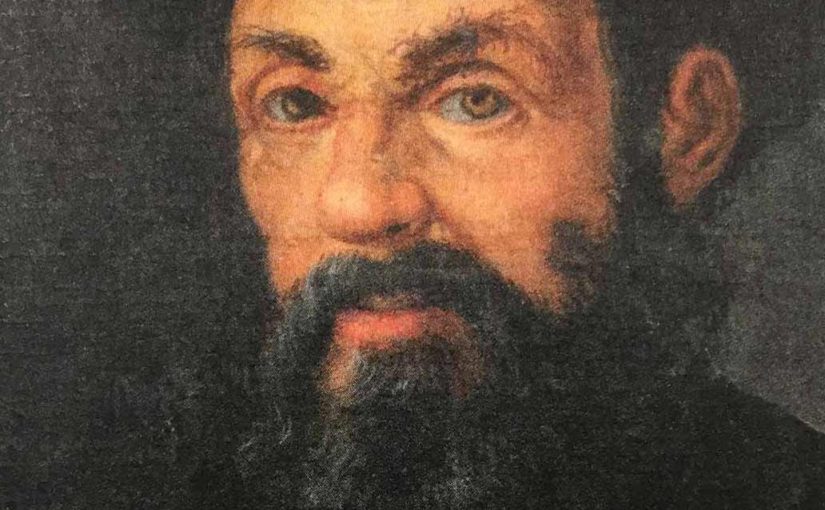composed and presented by Francois Bernadi
Much is being said about the difficulties to judge certain past crimes with today’s morals. Amazingly, this so different past is often less than ten years old. So what can you say about a man who lived 500 years ago?
Of course, what you can say does not matter. (He was some kind of man?) To judge is not easy, but we can think, we can feel… and a portrait might appear.
I am amazed by Magellan determination, blown away by his energy and I have an infinite admiration for the navigator. However, I have no sympathy for the man. More, I am disgusted by the senseless savagery he and his men committed during the second week of April 1520.
In the bay of San Julian where they ended up stranded for four months, the sailors met a native man from this southern region of South America. Others appeared. They were high in stature and because of their big feet they called them “Patagons”.
Shortly after the peaceful encounter, Magellan’s men kidnapped two individuals and brought them to the ship in chains with the intention to bring them back to Spain as “samples” from their discoveries. The two died in their cage not long after their captures.

What would Magellan think about these atrocities. Maybe not much. Maybe it was a thing to do, a small part of a mission. This one had failed.
For Magellan, the Christians were entitled to rule the world. Pagans were not humans unless baptized. Eventually, this thinking will bring this prodigious navigator to his end. In a mindless display of over-confidence, he would die pierced by arrows on an island shore of the Pacific north. It was an absurd turn of events and somehow one might see justice in it.
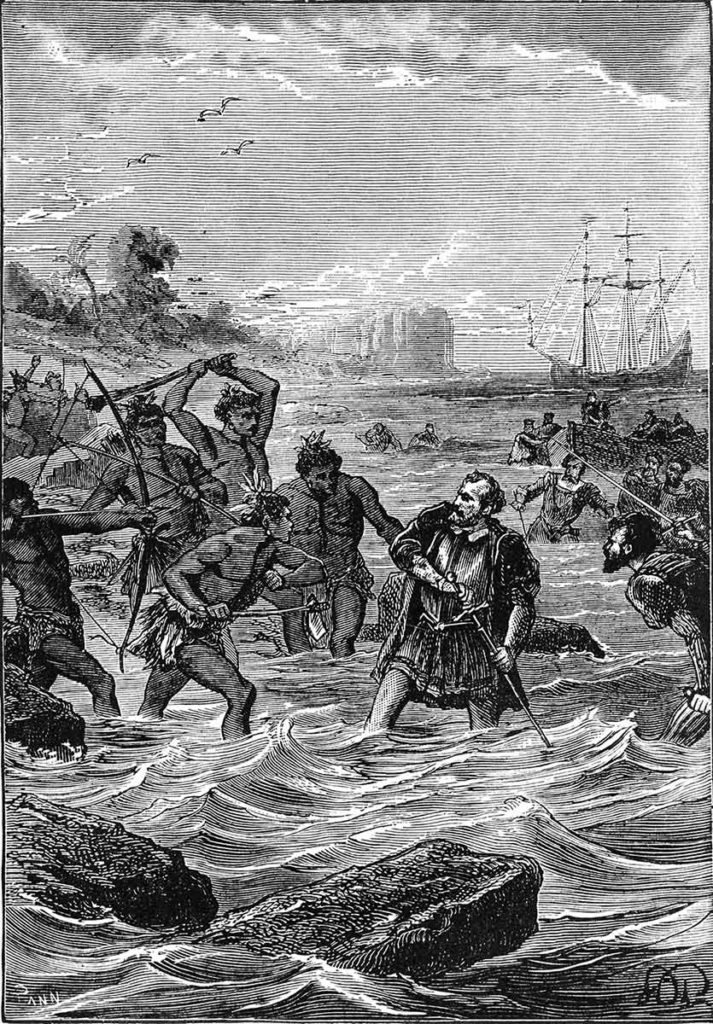
However, the mystery remains. It reminds me that we always know much more than we understand. Yes, it is difficult to judge someone from 500 years ago. But out of what we know we can try to draft a portrait and maybe understand a little.
Magellan’s times were merciless. Heroic eras are never sentimental. Little gratitude did the kings of Spain and Portugal show to those bold conquistadors who added whole worlds to their dominions. Columbus was brought back to Seville in chains; Cortez fell into disgrace; Pizarro was murdered; Nunez de Balboa, the discoverer of the Pacific, was beheaded; Camoens, Portuguese warrior and poet, spent, like Cervantes, months and years in a jail which was little better than hell. Amazing was the unthankfulness of the age of discovery. The soldiers and the sailors who had fought to secure the jewels of Montezuma and the treasures of the Incas for the Emperor wandered as beggars and cripples, lousy and neglected, in the alleys of Cadiz, Lisbon, and other sea ports. The few of them, that is to say, who did not leave their bones in the colonies, but returned home to be kicked hither and thither like mangy dogs.
Little as we know of his personality, this much is certain, that, small, obscure, inconspicuous, and silent as he was, he was utterly devoid of the arts which would have enabled him to woo the favour of the mighty or to make himself liked by his subordinates.
Fernão de Magalhães was not always an explorer. He began his career as a soldier in the Portuguese navy. He left Portugal in 1505 and sailed to India under the command of Francisco de Almeida. They were sent by King Manuel I to break Muslim sea power in India and Africa. Magellan left Lisbon on March 25, 1505. He would travel and fight in several battles over the next few years.
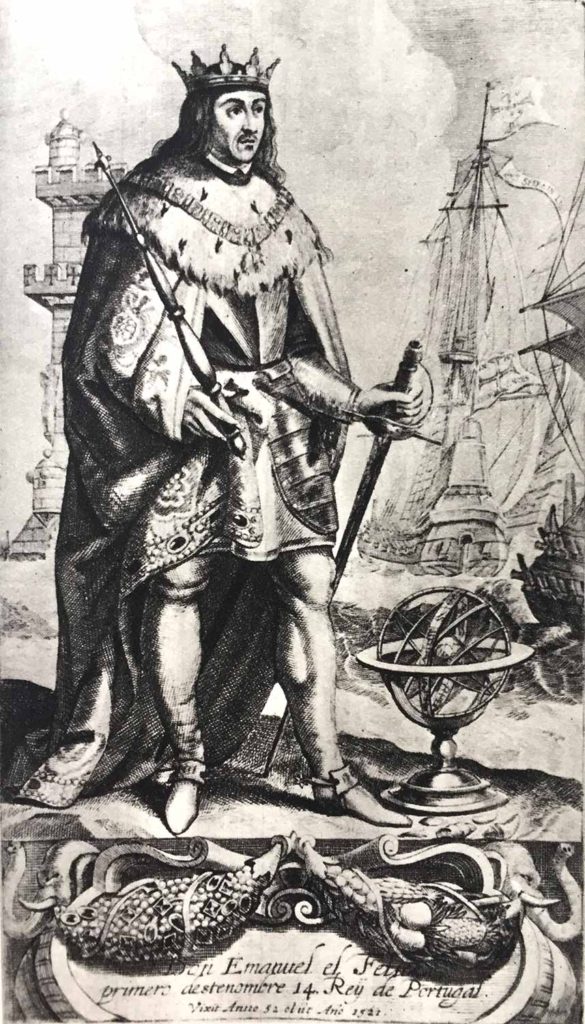
By thus participating in all risks and all tasks, he learns every trick of the trades of war and of commerce, becoming at one and the same time soldier, sailor, merchant, acquiring knowledge of men, lands, seas, and the movements of the stars. In due course, Destiny, having in view for him a lofty task, will have initiated him into those supreme concerns by which the station of his country and man’s knowledge of the globe will be decided for decades and for centuries. Thus it came to pass that, after a few minor skirmishes, which were plunder-raids rather than genuine warfare, Magellan received his true baptism of fire in the naval action of Cannanore on March 16, 1506.
For the first time one of Magellan’s most conspicuous character traits became manifest in his obscure personality. I refer to his hardihood, his formidable resolution. There was nothing emotional about him, nor anything to attract attention, and this explains why he remained so long in the background, for throughout life he was a man of the shadows. He had no talent for making himself conspicuous or for inspiring affection.
Yet whenever a task was set him and, even more, when he set himself a task, the obscure and secretive adventurer acted with a dazzling combination of shrewdness and courage. All the same, he never pushed himself into the foreground or boasted of his achievements. Having done some such deed as the rescue of Serrao, he quietly and patiently returned into the shadows. Since he had the gift of silence, he knew also how to wait, as if aware that, for the peculiar mission he was destined to fulfil, fate would continue to school him and to try him in various ways. Indeed, there was speedily to come a new trial. Almost immediately after arriving at Cannanore he had taken part in one of the greatest victories of the Portuguese fleet; then, in Malacca, he had participated in a great disaster. Now came a third test of courage, one of the hardest tests to which a mariner can be put, shipwreck.And yet, it counted for nothing that Magellan had fought at Cannanore,
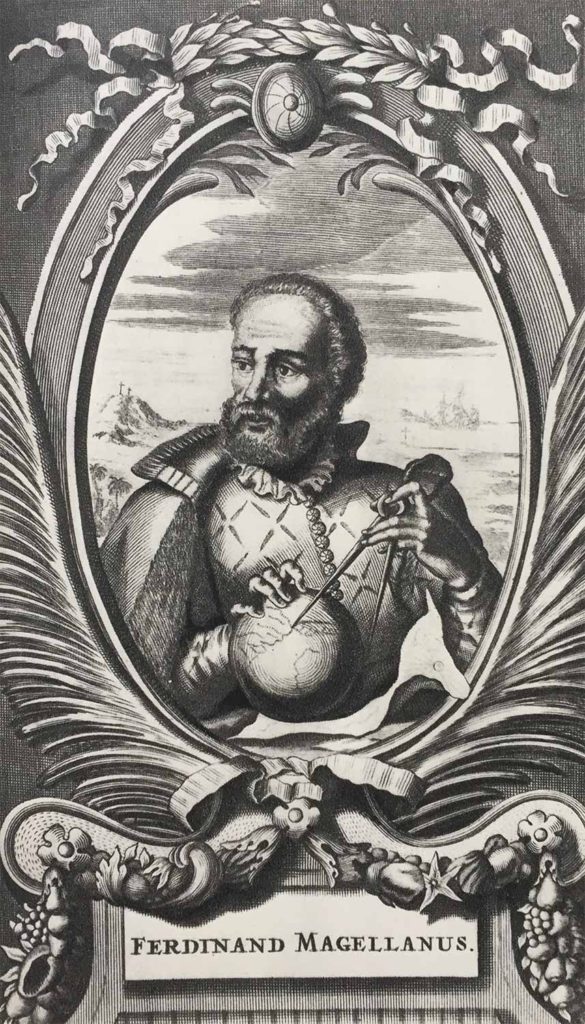
And yet, it counted for nothing that Magellan had fought at Cannanore,at Malacca, and in many other battles; that he had dozens of times risked life and health for Portugal’s victory. We know not why, but King Emanuel was always hostile to him (“sempre teve hum entejo”); and even the leal Pigafetta has to admit that his officers detested him (“li capitani sui lo odiavano”). He did not know how to smile, how to make himself amiable, how to be obliging, or how to advocate his ideas eloquently. Taciturn and reserved, always enwrapped in a cloud of loneliness, this perpetual solitary was environed with rime, ungraciousness, and mistrust. Half unconsciously his comrades were aware that in the silent depths of his being there lurked a strange and obscure ambition, which made his aims incomprehensible to them, and therefore rendered him far more suspect than are persons who hotly and frankly try to secure advantageous positions. There was always something hidden behind his hard, deep-set eyes, behind his hirsute mouth a mystery that could not be pierced.
A sinister impression is invariably produced by men who are able, year after year, to veil themselves in mystery, to refrain from the natural disclosures of frankness. From the first, Magellan created obstacles for himself through the obscurity of his nature. It was not easy for anyone to espouse his cause and march joyfully onward at his side; and perhaps it was harder still for this tragic solitary that his disposition compelled him to be so incessantly alone.
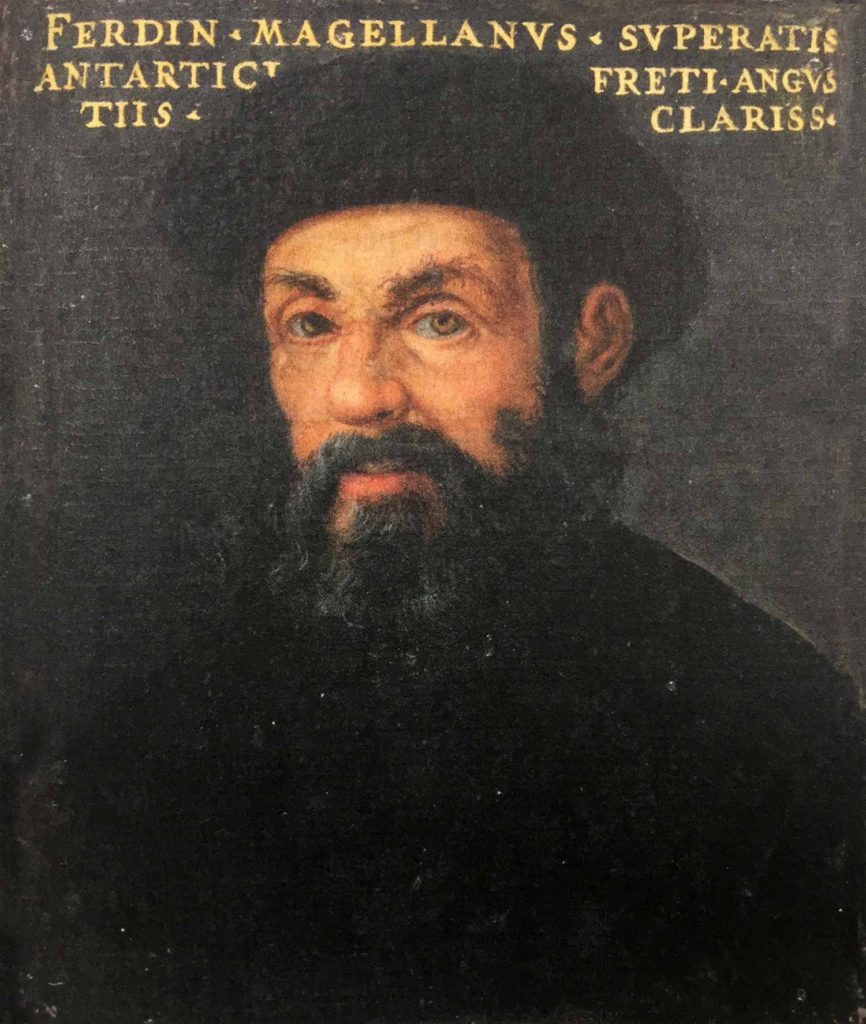
At thirty-five he had enjoyed all the experiences open to a warrior on land or to a mariner at sea. Four times he had doubled the Cape, twice from the west and twice from the east. Again and again he had risked his life; thrice he had been seriously wounded. He had seen an enormous amount of the world, knowing more of the East than did the most famous geographers and cartographers of his day. For nearly ten years he had been tried and tested in the technique of war. He had learned how to handle both sword and arquebus, tiller and compass, sails and artillery, spade and lance. He had studied navigation and knew how to keep a ship’s reckoning; was as good a leadsman as the most experienced of pilots; and was as precise a manipulator of the forerunners of quadrant and sextant as any “master of astronomy.” What others ‘learn timidly from books, he had learned boldly by repeated experience of calm and storm, battles by land and sea, rapine and siege, onslaught and shipwreck.
When Magellan formed a resolution, he never acted on it impulsively. Although contemporary descriptions have thrown little light on his character, it is plain that his remarkable gift for silence was displayed as a supreme virtue throughout his career. He was neither impatient nor loquacious, being able to hold inconspicuously aloof even amid the tumult of an army, and always able to think out his plans as a solitary. Looking far ahead, quietly reckoning with every possibility, he never disclosed a scheme or a resolve until his ideas were ripe, well thought out, and incontrovertible.
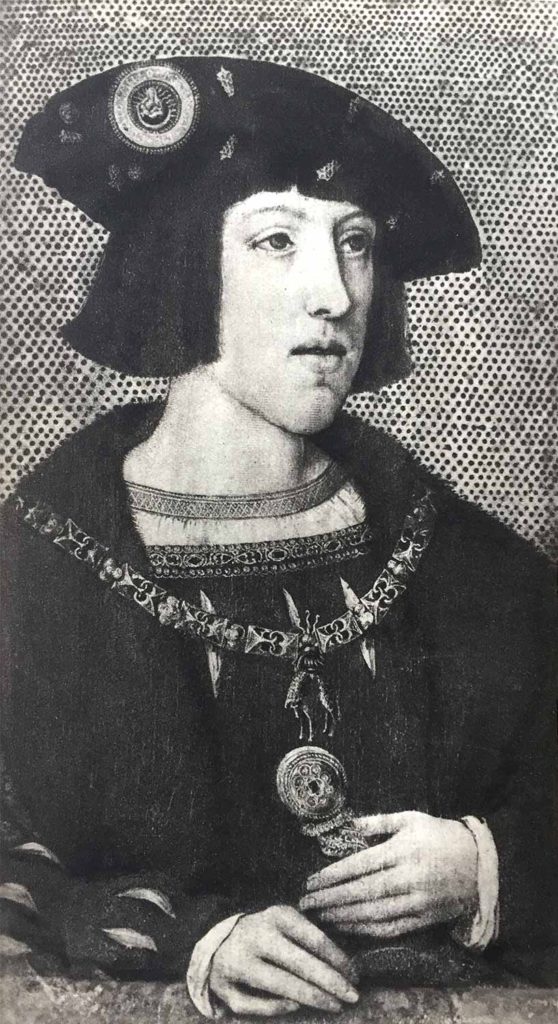
AS A YOUNG MAN
In October 1517 Magellan went to Seville and formally naturalized himself as a subject of Carlos I (the Emperor Charles V); he was joined in December by Ruy Faleiro, a man of repute as a cosmographer but of somewhat unbalanced mind.
On man who had a minor role in the expedition would become for Magellan the most important participator in his voyage. For what is an action worth when there is no one to describe it? A historical deed is not perfected when it has merely been achieved, but only when an account of it has been handed down to posterity. What we term history does not represent the sum-total of all conceivable things that have been done in space and time; history comprises those small illuminated sections of world happenings which have had thrown upon them the light of poetical or scientific description.
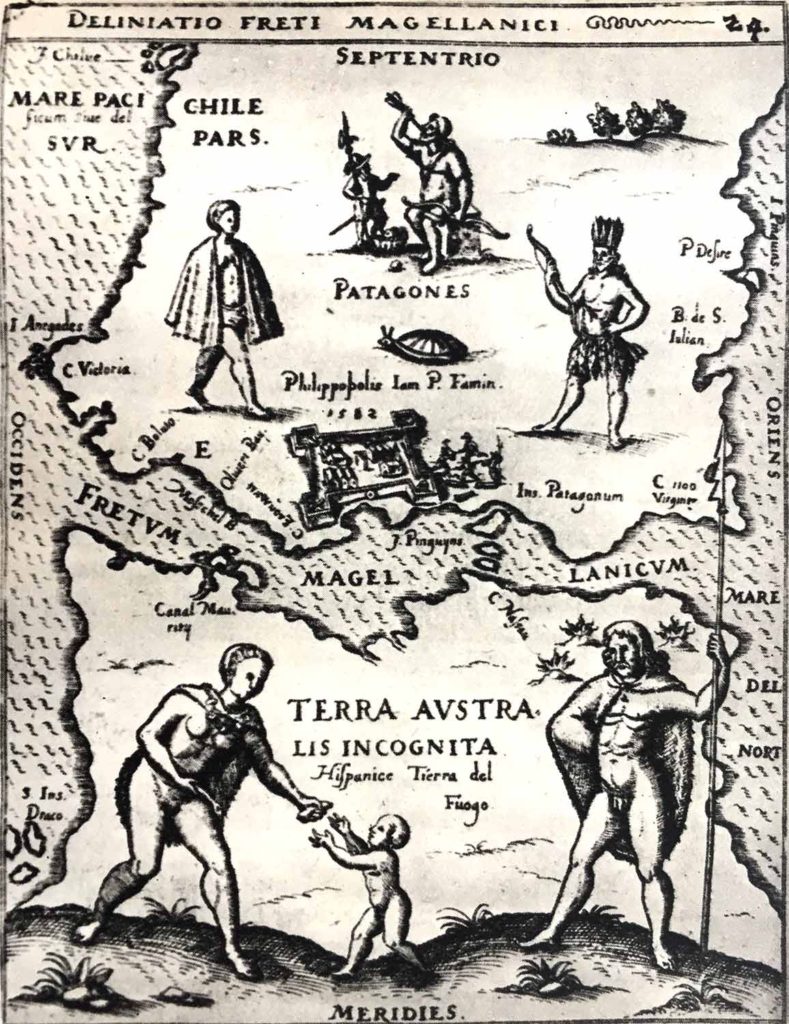
from an engraving in Hulsius’ Travels, 1626
Achilles would be nothing save for Homer. The figures of the world’s heroes would be shadows, and the deeds they did would have slipped unnoticed into the infinite azure of the past, had it not been for the chronicler who preserves them in his story or for the artist who creatively reconstructs them. Thus we should know little of Magellan and his exploits, aside a few dry sketches and log-books penned by the various pilots, if it was not for Antonio Pigafetta.
Pigafetta, inconspicuous supernumerary and Knight of Rhodes, was a dilettante in the best sense of the term, from pure delight in seeing, experiencing, admiring, wondering, staking his life for adventure’s sake. Only he, has preserved an adequate narrative of Magellan’s voyage.
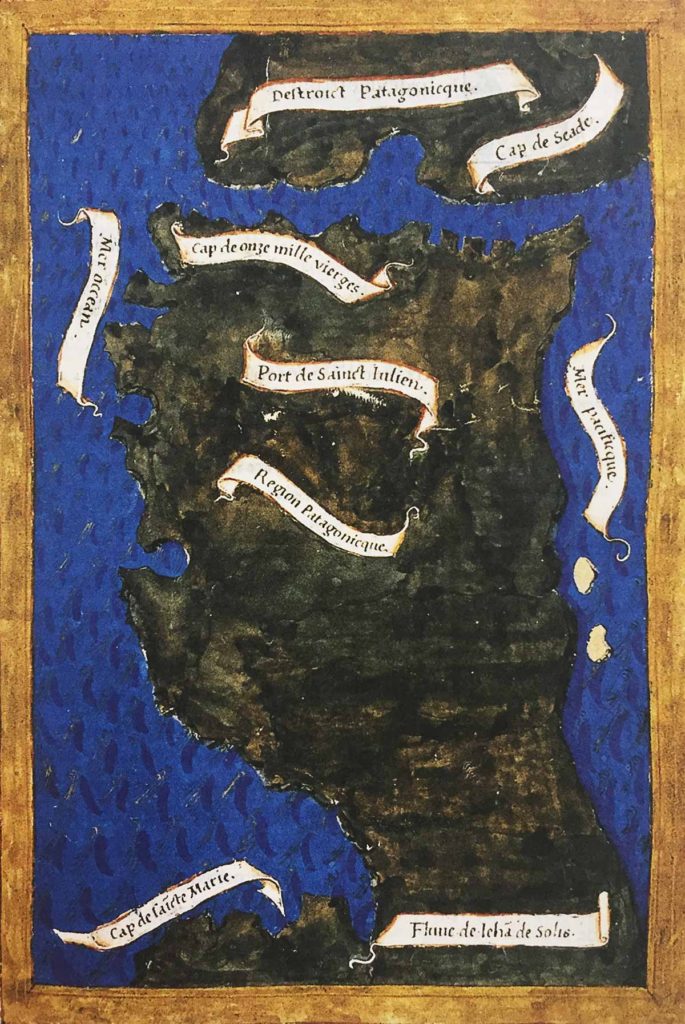
from the Pigafetta MS
in the Ambrosian Library, Milan
Another window into the character of Magellan is given by the will he left before his last voyage. Should the enterprise miscarry, should he not find the strait, or should his ships be wrecked, his wife and children, to avoid starvation, would have to hold out their hands for alms in front of church doors, invoking the aid of the pious. But even being an ardent Catholic, Magellan will never be vague and confused, so to the life after death he devotes the same amazing art of foresight that he displayed in his life on earth.
“When my present life shall end for the life eternal, I desire that if I die in the city of Seville my body may be buried in the monastery of Santa Maria de la Victoria . . .
in the grave set apart for me. And if I die in this said voyage, I desire that my body may be buried in a church dedicated to Our Lady, in the nearest spot to that at which death seizes me and I die.”
He desires that in the monastery of Santa Maria de la Victoria a thirty-day mass may be said for his soul. Further, “I desire that upon the day of my burial three poor men may be clothed, and that to each may be given a cloak of grey stuff, a cap, a shirt, and a pair of shoes, that they may pray to God for my soul; and I also desire that upon the said day of my burial food may be given to the said three paupers, and to twelve others, that they may pray to God for my soul; and I desire that upon the said day of my burial a gold ducat may be given as alms for the souls in purgatory.”
The burial taken care of, we expect the last will and testament to specify bequests to wife and child. However, we find that this deeply religious man is even more occupied about the fate of his slave. Perhaps before writing his will he had been troubled by scruples as to whether a true Christian was entitled to have a slave (especially one who had been baptized and was therefore a brother in the faith), and to treat as his own property a being with an immortal soul.
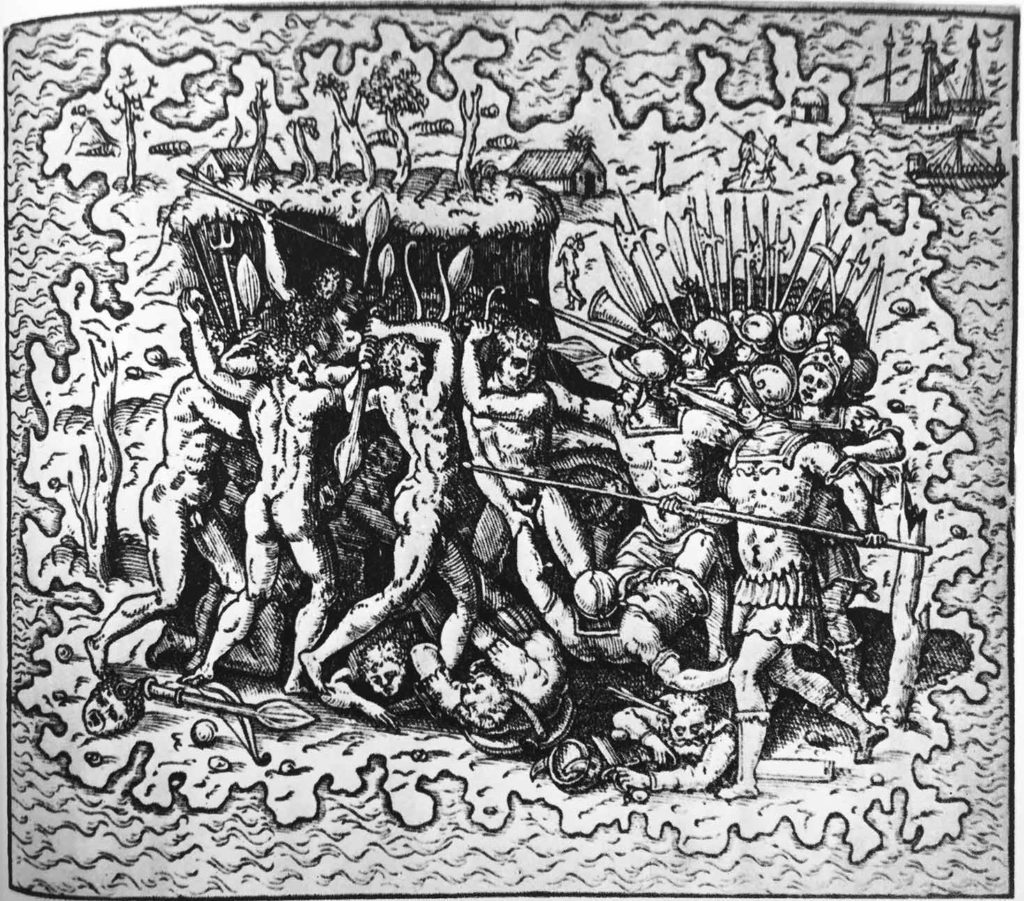
from a woodcut in Thevet’s Cosmographie Universelle, 1575
However that may be, Magellan does not wish to face his Maker with such disquiet on his mind, and he therefore specifies: “I declare and ordain that from the day of my death thenceforward for ever, my captured slave Enrique, mulatto, native of the city of Malacca, of the age of twenty-six years more or less, shall be free and manumitted, and quit, exempt, and relieved of every obligation of slavery and subjection, that he may act as he desires and thinks fit; and I desire that of my estate there may be given to the said Enrique the sum of ten thousand maravedis in money for his support; and this manumission I grant because he is a Christian and that he may pray to God for my soul.”
Only now, when he has devoted careful attention to a future life and has thought of the “good works which, at the Last Judgment, can speak on behalf of the most sinful,” does Magellan turn to the needs of his family. Even here he thinks first of something immaterial before troubling about the disposal of his property. Amid all the legacies we see that there is nothing which troubles him so much as what will happen to the arms and to the noble name of the Magellans, for he makes the most precise stipulations about what is to be done should (gloomy foreboding) his son die without leaving sons or daughters born in wedlock, stating who shall adopt the name and bear the arms of Magellan. Even as does the Christian, so does the nobleman, in this last will and testament, ardently crave for immortality.
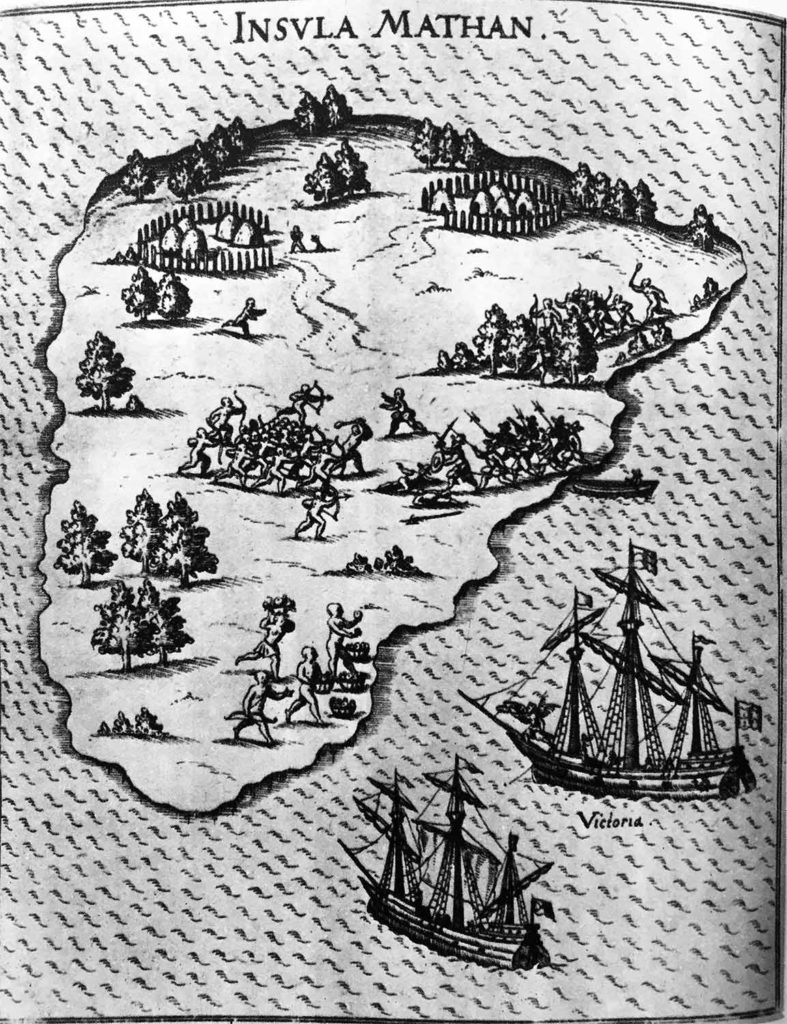
from an engraving in Hulsius’ Travels, 1626
However, destiny will not hear him, the eternal will of Fate being stronger than the will of any mortal. Not a single one of the wishes expressed by Magellan in his testament was fulfilled, not one of these carefully thought-out dispositions was respected. Magellan’s testament was to remain null and void. Those whom he had appointed his heirs were never to become heirs; the poor whom he had thought to console were not to be consoled; his body was not to be interred at the appointed place; and his coat of arms would cease to exist. Nothing but his great deed would survive the circumnavigator of the world, and all mankind, but no individual, would be his grateful inheritor.
The slave did not owe his freedom to Magellan. Enrique freed himself after the explorer’s death, having reached his native land. He was the first man to circumnavigate the World.
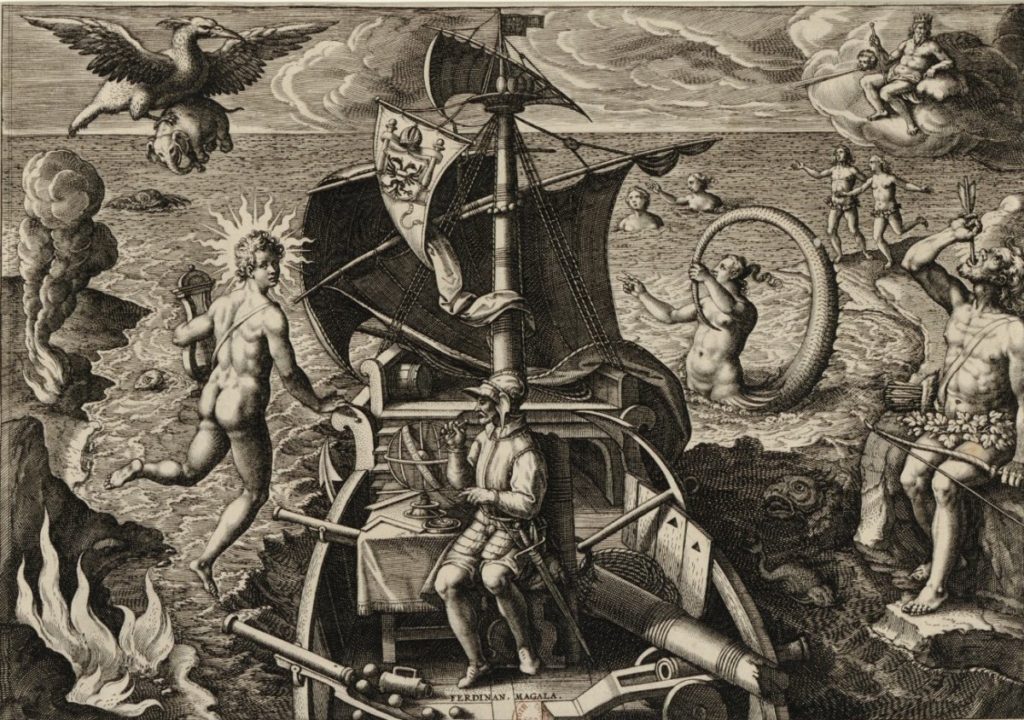
engraving of Jan Stradan from the 1594 edition of De Bry’s Voyages
